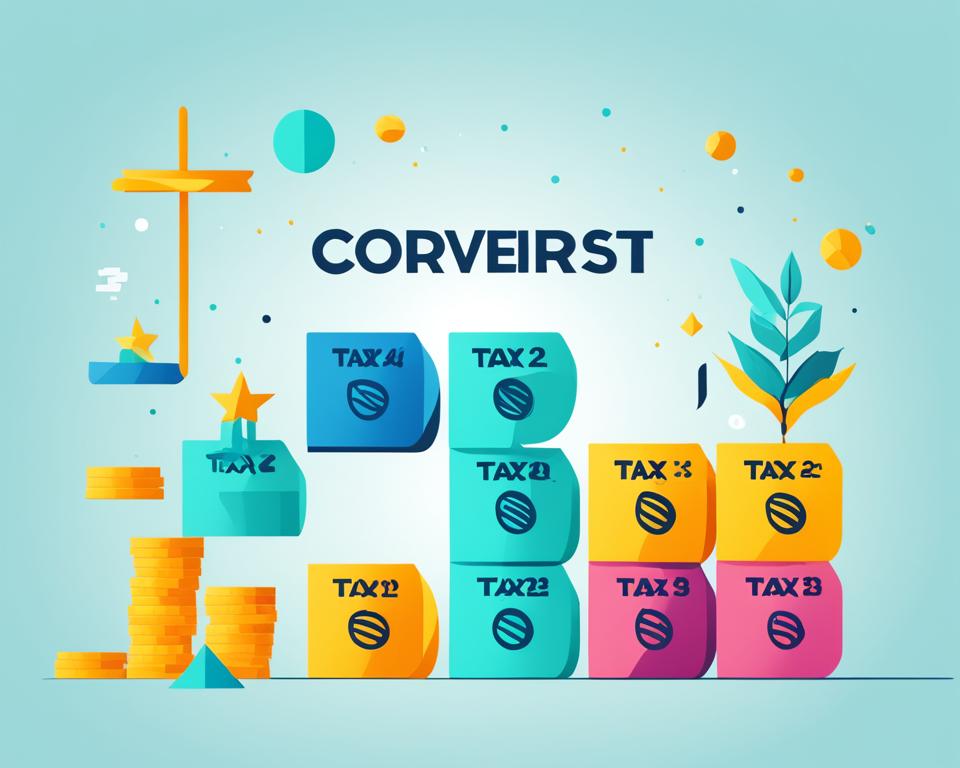The year 2024 is upon us, and with it comes a new tax season filled with updates, changes, and opportunities. As taxpayers gear up to file their taxes, it is essential to stay informed about the latest tax planning strategies, law changes, credits, deductions, and reforms.
2024 promises to be an interesting year for taxpayers, with the IRS announcing a variety of updates and improvements to enhance the filing experience. From improved services to new programs, here’s what you need to know to navigate the 2024 tax season successfully.
Key Takeaways:
- Stay informed about tax law changes and updates for the 2024 filing season.
- Take advantage of tax credits and deductions to maximize your tax savings.
- Consider leveraging tax planning strategies to minimize your tax liability.
- Utilize available resources and tools, such as software companies, tax professionals, and the IRS Free File program.
- File your taxes accurately and on time to avoid penalties and delays.
Important Tips for Filing Your Taxes in 2024
Tax season is approaching, and it’s essential for taxpayers to be well-prepared. Here are some important tips to help you navigate the tax filing process and maximize your returns in 2024.
Gather All Necessary Tax Documents
Before you start your tax filing, make sure you have all the necessary tax documents in hand. This includes your W-2 forms, 1099 forms, and any other documents reflecting your income or deductions. Having these documents organized will ensure accurate reporting and prevent delays in filing your tax return.
Report All Taxable Income Accurately
It’s crucial to report all taxable income accurately to avoid potential penalties or audits. Double-check your records and ensure that you haven’t missed any sources of income, such as freelance work, rental income, or investment earnings. Reporting your income truthfully and thoroughly will help you stay compliant with tax regulations.
File Electronically with Direct Deposit
Electronic filing is highly recommended for faster processing and receipt of your tax refund. By filing your taxes electronically, you can also take advantage of the convenience and security that comes with direct deposit. This means you’ll receive your refund directly into your bank account, eliminating the need for paper checks and potential mail delays.
Utilize the IRS Free File Program
If your adjusted gross income is $79,000 or less, you may be eligible for the IRS Free File program. This program provides free online tax preparation software that you can use to file your federal taxes electronically. Take advantage of this resource to save on tax preparation costs and streamline your filing process.
Maximize Your Tax Deductions
Be sure to take advantage of all available tax deductions to minimize your taxable income. The standard deduction has increased for the 2023 tax year, providing an opportunity to reduce the amount of income subject to taxation. Review the list of eligible deductions and consult with a tax professional to ensure you’re making the most of these tax-saving opportunities.
Stay Informed About Credits and Deductions
Stay up-to-date with the latest changes to tax credits and deductions that could impact your tax return. For example, familiarize yourself with the child tax credit, which may have undergone changes for the 2023 tax year. Additionally, if you’ve purchased a clean vehicle, you may be eligible for the clean vehicle credit. Being aware of these credits and deductions will help you claim the maximum tax benefits you’re entitled to.
| Tax Return Tips for 2024 | Benefits |
|---|---|
| Gather all necessary tax documents | Ensures accurate reporting and prevents filing delays |
| Report all taxable income accurately | Avoids penalties and audits |
| File electronically with direct deposit | Fast processing and receipt of tax refund |
| Utilize the IRS Free File program | Save on tax preparation costs |
| Maximize tax deductions | Reduce taxable income |
| Stay informed about credits and deductions | Claim maximum tax benefits |
Key Changes in Tax Law for 2023
As the 2024 tax season approaches, it’s important for taxpayers to familiarize themselves with the key changes in tax law that took effect in 2023. These changes can have a significant impact on your tax liability, deductions, and credits. Here are some important updates to be aware of:
Enhanced Child Tax Credit
Congress is currently considering an enhanced child tax credit, which, if approved, could benefit approximately 15 million children. This credit aims to provide additional financial assistance to families with dependent children, potentially reducing their tax burden. Stay tuned for updates on the progress of this proposal.
Delayed Reporting Threshold for 1099-K Forms
For the 2023 tax year, the IRS has delayed the $600 reporting threshold for 1099-K forms. This means that individuals who receive income from various sources, such as freelancing or gig work, may be required to report their earnings even if they earn less than $600. It’s crucial to accurately report all income received to ensure compliance with tax laws.
Expanded Income Limit for IRS Free File
IrsIRS Free File is an excellent resource for eligible taxpayers to file their taxes electronically for free. The income limit for this program has been expanded to $79,000, allowing more individuals to take advantage of this convenient service. By using IRS Free File, taxpayers can simplify the tax filing process while potentially saving money on tax preparation fees.
Tax Brackets and Standard Deduction Amounts
It’s essential to stay up to date with the tax brackets and standard deduction amounts for the 2023 tax year. These figures determine the portion of your income that is subject to taxation and can significantly impact your overall tax liability. Be sure to consult the IRS guidelines or a tax professional to ensure accurate reporting.
Direct File Pilot Program
The IRS has introduced a pilot program called Direct File, which allows eligible taxpayers in 12 states to file their federal tax returns directly with the IRS. This program aims to streamline the tax filing process by eliminating the need for third-party software or tax professionals. If you qualify for Direct File, you can save time and money while ensuring the secure and efficient submission of your tax return.
State Payments and Taxability
It’s important to note that some state payments may not be taxable. However, the taxability of these payments can vary depending on your specific circumstances and the state you reside in. To ensure accurate reporting, it’s advisable to consult a tax professional who can provide guidance tailored to your situation.
Tax Filing Deadline
The tax filing deadline for the 2023 tax year is April 15, 2024. It’s crucial to submit your tax return by this deadline to avoid penalties and interest charges. If you need additional time to prepare your tax return, you can request an extension, which will grant you until October 15, 2024, to file your return. However, it’s important to note that any taxes owed must still be paid by the original deadline to avoid any potential penalties.
Staying informed about these key changes in tax law for 2023 is essential to ensure accurate and timely tax filing. By understanding these updates, you can effectively navigate the tax season and maximize your tax benefits. Consult an expert or utilize available resources to make the most of the available tax deductions, credits, and programs.
Conclusion
As the 2024 tax season begins, taxpayers should be prepared for the changes in tax law and take advantage of available resources and programs. Filing taxes accurately and on time is essential to avoid penalties and delays. By staying informed and following the guidance provided by the IRS, taxpayers can navigate the tax season smoothly and maximize their returns while minimizing their liability.
FAQ
When does the 2024 tax season start?
The official start date of the 2024 tax season is January 29, 2024.
When is the deadline for filing 2024 tax returns?
The deadline for filing 2024 tax returns is April 15, 2024, with an extension deadline of October 15, 2024.
How many individual tax returns are expected to be filed for the 2024 tax season?
The IRS expects over 128.7 million individual tax returns to be filed by the April 15, 2024 deadline.
Can taxpayers start working on their taxes before the official start date?
Yes, taxpayers can start working on their taxes early using software companies or tax professionals. IRS Free File will also be available starting January 12, 2024.
What improvements have been made to IRS services for the 2024 tax season?
The IRS has made improvements to services such as in-person assistance, phone support, and the Where’s My Refund? tool. They have also introduced enhancements for paperless processing and an Individual Online Account.
What is the Direct File pilot program?
The Direct File pilot program allows eligible taxpayers to file their federal tax returns directly with the IRS for free. It is currently available to taxpayers in 12 states.
What documents should taxpayers gather before filing their tax returns?
Taxpayers are advised to gather all necessary tax documents before filing their tax returns and to report all taxable income accurately.
What is the income limit for IRS Free File?
The IRS Free File program is available for taxpayers with an adjusted gross income of ,000 or less.
How can taxpayers ensure faster processing and receipt of refunds?
It is recommended to file electronically with direct deposit to ensure faster processing and receipt of refunds.
What changes should taxpayers be aware of for the 2023 tax year?
Taxpayers should be aware of changes to credits and deductions, such as the child tax credit and the clean vehicle credit. The standard deduction has also increased for the 2023 tax year.
Is there an enhanced child tax credit being considered by Congress?
Congress is considering an enhanced child tax credit, which could benefit around 15 million children if approved.
Has the reporting threshold for 1099-K forms been delayed?
Yes, the IRS has delayed the 0 reporting threshold for 1099-K forms for the 2023 tax year.
Can taxpayers still use IRS Free File?
Yes, taxpayers can still use IRS Free File, which has expanded its income limit to ,000.
Can state payments be taxable?
Some state payments may not be taxable, but taxpayers should consult a tax professional for clarification.





